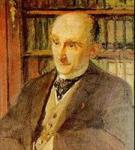 LISTEN. We rejoin James in his early sixties, in 1903: a time of rapid (by the standards of the day) mechanization. “A Packard accomplished the first automobile trip across the United States,” San Francisco to New York, in the astonishing time of just fifty-two days.
LISTEN. We rejoin James in his early sixties, in 1903: a time of rapid (by the standards of the day) mechanization. “A Packard accomplished the first automobile trip across the United States,” San Francisco to New York, in the astonishing time of just fifty-two days.  The Wright Brothers have just gone aerial. And Henry Adams is yearning for the thirteeth century’s cult of the Virgin of Chartres.
The Wright Brothers have just gone aerial. And Henry Adams is yearning for the thirteeth century’s cult of the Virgin of Chartres.To get slightly ahead of our story: James exchanged letters with Adams not long before his death, responding to the latter’s dark musings about the Second Law of Thermodynamics, the inevitable “heat death of the universe” and so on, this way:
“Though the ULTIMATE state of the universe may be its… extinction, there is nothing in physics to interfere with the hypothesis that the PENULTIMATE state might be a happy and virtuous consciousness… In short, the last expiring pulsation of the universe’s life might be, “I am so happy and perfect that I can stand it no longer.”That’s looking on the bright side.*

James’s great intellectual excitement at this time is his discovery of the “process” philosophy of Henri Bergson, his elan vital and his perception of time’s inexorable forward momentum. “It is like the breath of the morning and the song of birds. And to me it tells of reality itself and not merely of what previous dusty-minded professors have thought about reality.”
(Note that it’s always other professors’ dusty-minded ideas one must shake off.)
This is when James wrestles, somewhat ineffectually, with “the Ph.D. Octopus.” If exclusionary formal credentialing was already out of hand then, how much worse is it now? Short answer: lots.
This is also when he really first appreciates his fundamental consanguinity with
 John Dewey, who “makes biology and psychology continuous” and whose “favorite word is situation.” (His second-favorite was “reconstruction”).
John Dewey, who “makes biology and psychology continuous” and whose “favorite word is situation.” (His second-favorite was “reconstruction”).And this is the time of the Emerson centenary, when James orates in memory of New England’s great Socratic Transcendentalist:
“The deep today which all men scorn” receives thus from Emerson superb revindication. “Other world! there is no other world.” All God’s life opens into the individual particular, and here and now, or nowhere, is reality. “The present hour is the decisive hour, and every day is doomsday.” Such a conviction that Divinity is everywhere may easily make of one an optimist of the sentimental type that refuses to speak ill of anything. Emerson’s drastic perception of differences kept him at the opposite pole from this weakness. After you have seen men a few times, he could say, you find most of them as alike as their barns and pantries, and soon as musty and dreary. Never was such a fastidious lover of significance and distinction, and never an eye so keen for their discovery. His optimism had nothing in common with that indiscriminate hurrahing for the Universe with which Walt Whitman has made us familiar…1904 brings the nominal birth of James’s “radical empiricism,” made radical by its refusal to concede the reality of “any element that is not directly experienced nor exclude any element that is directly experienced.” Bertrand Russell, famously disapproving of James’s “Will to Believe“– make-believe, Russell had sneered— said James “was right on this matter, and would on this ground alone deserve a high place among philosophers.” (More Russell quotes)
*Russell also agreed with James’s rejection of cosmic pessimism, even supposing our sun and galaxy and universe must someday expand and collapse and disappear:
I am told that that sort of view is depressing, and people will sometimes tell you that if they believed that, they would not be able to go on living. Do not believe it; it is all nonsense. Nobody really worries about what is going to happen millions of years hence. Even if they think they are worrying much about that, they are really deceiving themselves. They are worried about something much more mundane, or it may merely be a bad digestion; but nobody is really seriously rendered unhappy by the thought of something that is going to happen to this world millions and millions of years hence.Long-term thinking is good, wondering what life will make of itself is vital… but let’s not get carried away! The end of the universe is (almost) unimaginably remote, much moreso than the potential end of a humanity victimized by its own self-destructiveness. This would have been Russell’s answer to young “Alvy Singer”… it was in fact the essence of what “Dr. Flicker” advised:
My Grandfather Philosophy #5 is about me dealing with an existential crisis sparked by reading Falter against the background of the collapse of the American experiment. It tees of Alvy's depression because of the end of the universe, and will probably be entitled "What's the Point?" Spoiler alert: Spinoza saves me.
ReplyDeleteThanks goodness (God, Nature, Necessity) for Spinoza!
ReplyDelete